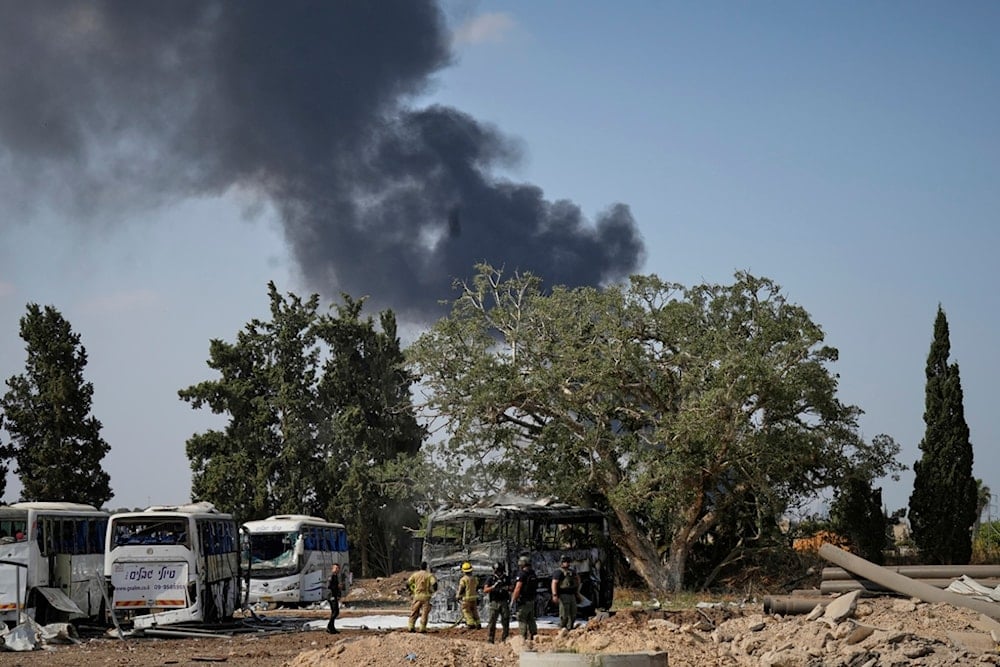ICAN condemns Israeli strikes on Iranian nuclear facilities
A single 100-kiloton detonation, the group said, could kill hundreds of thousands instantly, with millions more suffering long-term injuries.
-

Smoke rises from an oil storage facility after it appeared to have been struck by an Israeli strike on Saturday, in Tehran, Iran, Monday, June 16, 2025 (AP Photo/Vahid Salemi)
The International Campaign to Abolish Nuclear Weapons (ICAN) has issued a stark warning following "Israel's" large-scale airstrikes on Iranian nuclear infrastructure, cautioning that such actions threaten to unravel decades of diplomatic work on nuclear non-proliferation and risk triggering a regional catastrophe.
"Israel" on June 13 launched a full-scale assault on Iranian territory. The operation, planned for months with overt US backing, included coordinated strikes on over 250 sites, among them nuclear research centers, air bases, IRGC facilities, civilian infrastructure, and even hospitals.
ICAN's Executive Director Melissa Parke condemned the attacks, stating on Tuesday that attacking nuclear facilities is illegal and risks releasing radiation, posing a long-term threat to human health and the environment. She warned that further escalation could have devastating humanitarian consequences, especially when instigated by a nuclear-armed state.
According to Parke, the assault by "Israel", the only country in the region with nuclear weapons, undermines global non-proliferation efforts and risks a broader war. She urged the international community, including Tel Aviv's allies, to condemn its actions and apply pressure to end hostilities.
Nuclear Reckoning
ICAN pointed to the disproportionate and potentially catastrophic impact of nuclear weapons use. A single 100-kiloton detonation, the group said, could kill hundreds of thousands instantly, with millions more suffering long-term injuries. The fireball from such a blast would extend nearly 400 meters in all directions, while radiation and shockwave effects would devastate areas up to nine kilometers away.
Despite the intensity of the Israeli strikes, IAEA Director General Rafael Grossi confirmed Monday that no significant radiation had been released at Natanz and no new damage had been detected at the site. He also praised Iranian cooperation with the agency in the immediate aftermath of the attack.
Treaty Unraveling
The political fallout, however, is worsening. Iran's parliament has begun deliberations on legislation to withdraw from the Treaty on the Non-Proliferation of Nuclear Weapons (NPT), although no final decision has been taken. Iran has also announced it will reduce its cooperation with the International Atomic Energy Agency.
Read more: Tehran unravels documents exposing secret IAEA-'Israel' collusion
ICAN warned that this sequence of events could seriously undermine both the NPT and the Treaty on the Prohibition of Nuclear Weapons (TPNW), two cornerstones of the international nuclear disarmament architecture. "These treaties are essential tools for achieving peace and security in the region and globally," Parke stressed, adding that "Israel" must join both treaties without delay.
Disarmament Imperative
ICAN estimates that "Israel" spent over $1 billion on its nuclear arsenal in 2024 and currently holds approximately 90 warheads, according to figures also cited by the Federation of American Scientists. While both the IAEA and the United States affirm that Iran is not currently developing nuclear weapons, "Israel's" actions have put future negotiations in jeopardy.
The escalation has drawn mixed international responses. The G7 issued a statement backing "Israel's" "security," while 20 foreign ministers from TPNW-signatory nations warned that the strikes pose "serious threats to the security and stability of the entire region."
ICAN concluded its statement by urging all nations to abandon reliance on "humanity-ending weapons" and commit to multilateral disarmament. "The 2017 Treaty on the Prohibition of Nuclear Weapons offers a verified and legal path forward. It is time to choose peace."
Read more: More US lawmakers push to block unauthorized war on Iran

 4 Min Read
4 Min Read










